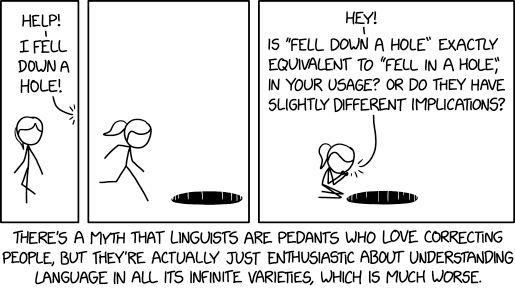You are using an out of date browser. It may not display this or other websites correctly.
You should upgrade or use an alternative browser.
You should upgrade or use an alternative browser.
Help with English
- Thread starter Saint
- Start date
Seattle
Valued Senior Member
Is music both singular and plural? Yes.Music got plural? Musics?
Seattle
Valued Senior Member
Yet there is no difference between "him" and "her", right?English is weird, the words brother/sister do not tell you elder or younger?
Chinese language got different words for younger and elder sister/brother.
Seattle
Valued Senior Member
Systemic refers to the system as a whole as in "systemic racism". Systematic refers to an ordered way of doing something. A systematic way of solving a problem is to start from the beginning and not skipping any steps along the way.systemic vs. systematic
Saint
Valued Senior Member
there is different, pronunciation is the same, but writing is different,Yet there is no difference between "him" and "her", right?
female 她
male 他
DaveC426913
Valued Senior Member

"Do you feel like the answer depends on whether you're currently in the hole, versus when you refer to the events later after you get out? Assuming you get out."
Yet there is no difference between "him" and "her", right?
Funny you should say that
I have a Transaction app
English / Indonesian, Indonesian / English
Most of the girls I chat with are much better with their understanding of English than I am with Indonesian
If I do need to translate for them I type English top window and obtain Indonesian bottom window
I have learnt to copy the transaction, place it under the English in top window and select Translate to English
I get the bottom two when translating the top two into Indonesian
- boyfriend
- girlfriend
- pacar
- pacar perempuan
- boyfriend
- girlfriend
- girlfriend
- girlfriend
Last edited:
Saint
Valued Senior Member
Fell into a hole.
"Do you feel like the answer depends on whether you're currently in the hole, versus when you refer to the events later after you get out? Assuming you get out."
Doesn't Chinese tend to use compound words, though, where they build a single word from multiple smaller words ? Such as your example of different words for paternal and maternal grandparents. If you broke it down into those simpler words, you'd still be using two ideas - as you describe "inner/outer grandparent" etc?Grandmother and grandfather,
in Chinese, the mother/father of your mother and father, are of different words.
Normally, we call the grandparents of mother as "outer grandparents"
father's one as "inner grandparents".
In English we tend to keep the ideas separately expressed (the grandparent, and whether on mother's or father's side etc), separating adjective from noun, adverb from verb etc, although we still do use plenty of compound words (e.g. weekend etc).
There are languages in Europe that use far more compound words than English, and almost seem to prefer to just push smaller words together to form one word. So where as in English we would say "legislative law for the monitoring of pork-meat labeling", in Germany they came up with the single word Schweinefleischetikettierungsüberwachungsaufgabenübertragungsgesetz.
Now that is what I would call weird.
Yes, and it can be exampled as follows:ability vs. capability,
any difference?
Most people have the capability of searching the internet for answers to questions they might have.
However, some show less of an ability than others in doing so.
i.e. A capability is either a yes/no matter - you either have the capability or you don't.
An ability is a skill that can be quantified / compared.
But people do tend to use them interchangeably.
Write4U
Valued Senior Member
"Grammarly" is a very useful linguistic tool. Even better, it's free.If you don't have a good English dictionary, just refer to Dictionary.com . It aggregates definitions from several different dictionaries, and it also includes notes on proper usage, as well as etymologies.
Write4U
Valued Senior Member
Wow, this Grammarly program is really interesting. It is much more than a spell checker
Here are some notifications from Grammarly in context of this post;
https://en.wikipedia.org/wiki/GrammarlyGrammarly
is a cross-platform cloud-based[4] writing assistant[5][6] that reviews spelling, grammar, punctuation, clarity, engagement and delivery mistakes in real-time.[7] It uses AI to identify and search for an appropriate replacement for the mistake it locates. It also allows users to customize their style, tone, and context-specific language.[8] It was launched in 2009 by Alex Shevchenko, Max Lytvyn, and Dmytro Lider.[9]
Here are some notifications from Grammarly in context of this post;
Fix spelling and grammar; 2
PREDICTIONS

Sounds friendly
Last edited:
exchemist
Valued Senior Member
No. Look it up.Is skiff and boat the same?
exchemist
Valued Senior Member
Depth in modern nautical charts is expressed in metres.Why fisherman count in fathom (=6 ft)? Instead of meter, feet?
The fathom is just one of many old units of measure, deriving from the times when trades and professions were much more self-contained than today, so the need to compare measures across different applications was far less. According to Wikipedia, the fathom seems to go back to the Ancient Greeks (ὀργυιά, meaning "outstretched" - the distance of a man's outstretched arms, approx 2 m or 6ft.).
